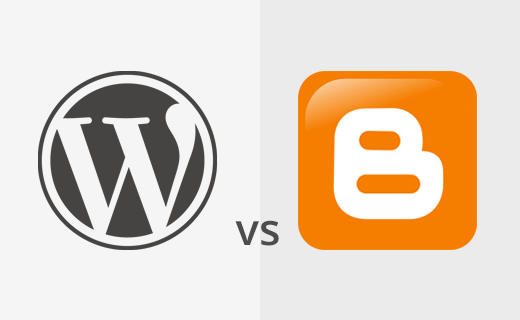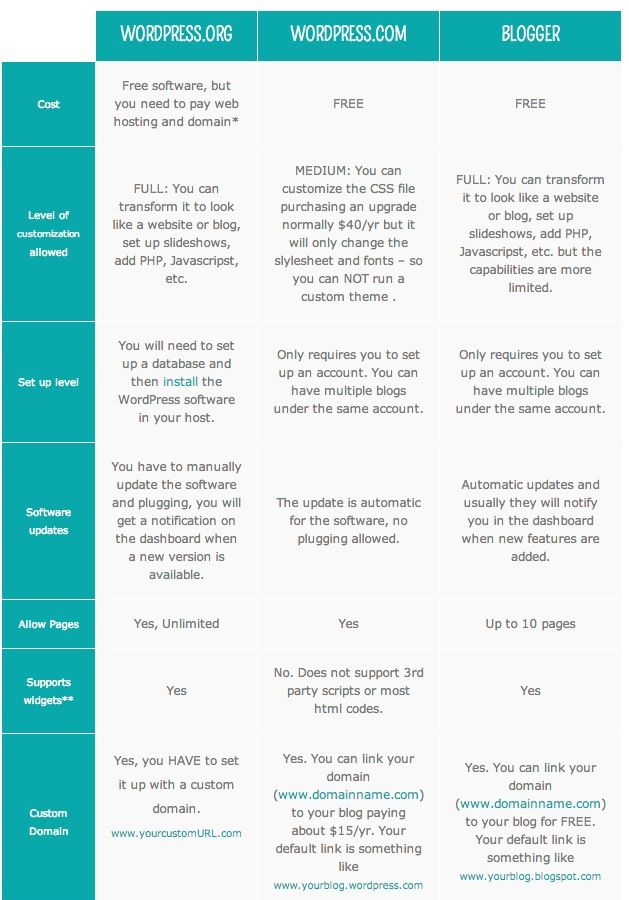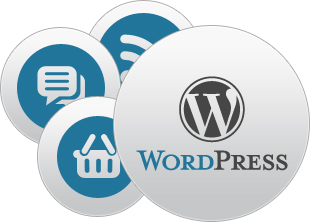Website Platforms

We are often asked by new users why they should use WordPress instead of free blogging services like WordPress.com or Blogger? WPBeginner is the largest resource site for WordPress beginners, so it is obvious that we favor WordPress over other blogging platforms. In this article, we will do a WordPress vs Blogger comparison to help you decide which one is better for your needs. We will cover all WordPress vs Blogger pros and cons, so you can make the best decision when it comes Blogger vs. WordPress as a platform for your site.
Here is a handy chart from HowJoyful, explaining the feature differences between BlogSpot vs. WordPress.com vs. Self-hosted WordPress (WordPress.org):

Website Platforms
Squarespace costs
It’s fairly easy to understand the costs involved with Squarespace: there are four monthly plans available:
- Websites Personal – $16 per month
- Websites Business – $26 per month
- Commerce Basic – $30 per month
- Commerce Advanced – $46 per month
These plans work out a bit cheaper if you pay on an annual basis ($12, $18, $26 and $40 per month respectively).
The main differences between the Squarespace plans involve the number of pages you can create; transaction fees; integration with Xero; and e-commerce features.
The ‘Personal’ plan is quite restrictive and is not really suited to business applications at all – this is because it doesn’t facilitate e-commerce and restricts the number of integrations with third-party apps you can use. It doesn’t even allow you to add custom code to your site, meaning you can’t even add a mailing list form to it. So, I generally advise my clients to avoid it.
As you might expect, the more expensive Squarespace plans come with more features, particularly where e-commerce is concerned. I’ll highlight key ones below but for a more in-depth overview of the differences between each Squarespace pricing plan, please see our full Squarespace review.
If you pay annually for your Squarespace plan, you’ll get a free custom domain too – but you should note that not all domain extensions are catered for.
WordPress costs
“Hey, WordPress is free” I hear you cry. Well no, not exactly, because to get it working properly you need to pay for other stuff.
There are five things that will generally affect your costs:
- hosting (server space on which to install WordPress and store your site)
- themes (the design for your site)
- e-commerce integration (addition of tools that will let you sell products online)
- plugins (apps that can be added to your site to add more functionality)
- whether or not a developer is involved in your site build.
The one thing you’ll always have to pay for hosting: without it you have nowhere to install WordPress. There are a wide range of options available on this front, but the key choice you’ll have to make is whether you’d like to use a ‘shared hosting’ company (cheap but slower) or a provider such as WP Engine that specialises exclusively in WordPress hosting (faster, more secure – but more expensive). For a small to medium-sized project you’re typically looking at costs of between $4 (shared hosting) and $30 (managed WP hosting) a month.
With regard to the other factors, you can technically get away with using a free template, e-commerce integration, and plugins – but realistically, to get higher quality results it’s usually worth investing in your site.
Below you’ll find some figures which demonstrate some costs you might expect if you were building your site yourself:
- Annual hosting, using managed WordPress hosting from WP Engine as an example: $348 (recurring cost)
- Premium theme: $175
- Annual cost for e-commerce integration (using Ecwid as an example): $180 (recurring cost)
- 4 paid-for plugins: $100
If you were to use a developer to help you configure, build and maintain your site, you’d have significantly higher costs (but in all likelihood would be getting a better product).
In terms of how these sorts of costs compare to using Squarespace, depending on what sort of plan you’re on, you’re looking at an annual cost of between $144 and $480. This means that using Squarespace can actually work out cheaper than using WordPress, despite it being a paid-for option and WordPress being an open source one.
Pricing, however, should not be the only thing you consider in the WordPress vs Squarespace debate. Let’s take look at features…
Uncategorized
There are a million ways to create a website, and WordPress is just one of those ways. Yet many people just choose WordPress because that’s what everyone is using or because they don’t know about the other options. The problem is that WordPress may not always be the right tool for the job.
Using the right tool for the job helps you complete the job quicker and with less risk of injury. This article explains why this holds true for building websites as well.
WordPress isn’t always the right choice
I make a living providing WordPress tech support, yet I wouldn’t recommend WordPress if…
You want the simplest option possible for a website. Despite WordPress’ ease of use, it’s not quite so easy to setup. You need to purchase hosting and a domain name, sometimes from separate vendors. Then you need to choose a theme, from a huge number of providers, and then install and configure the theme. You need a certain level of tech-savviness just to be able to do this, and some web development experience to do this well.
You want a maintenance-free website. WordPress releases an average of 3 major updates each year. In between they have about 3 minor updates containing security and bug fixes. On top of that, your plugins and themes may be updated frequently as well.
Oh, don’t forget the website backups, server administration, fighting hackers and more. WordPress is definitely not the choice for a “launch it and forget it” type website.
You want to design your site, but you don’t know coding.
Can I move this section above this?
Can I change the font and color?
Can I have a different layout for just this page?
Can I increase the size of my header / logo?
The answer to all of the above is: not unless you know how to edit the template code, even for the new-fangled drag-and-drop builder themes. Sorry!
To WordPress, or not to WordPress?
At the end, it boils down to your requirements. If ease of setup and customization, and maintenance-free are important to you – WordPress may not be the right choice. But for everything else, you won’t go wrong with WordPress. Just like with anything worth doing, expect to spend some time learning and growing with WordPress. Having a reliable WordPress support team doesn’t hurt as well.
Tech Listing Reviews, Website Platforms
Grav

Grav is another flat-file content management system. Again, that means it doesn’t use a database.
Interestingly, Grav is developed by RocketTheme, a Joomla template and WordPress theme shop.
One advantage of Grav is that you can easily define custom fields for any of your content. And you can also use unlimited taxonomies to manage content.
Like Pulse CMS and Craft CMS, Grav is more suited for developers than casual users.
Price: Free | More Information
WordPress.org

WordPress is an online, open source website creation tool written in PHP. But in non-geek speak, it’s probably the easiest and most powerful blogging and website content management system (or CMS) in existence today.
What do TED, Flickr, The New York Times, Boing Boing, the Chicago Bulls, BBC America, Beyonce, The New Yorker, Vogue, The Rolling Stones, and thousands of other people have in common? They all made their official blogs and sites with WordPress.org. Launched in 2003, it doesn’t need any introduction except the long list of sites using it today and the fact that it powers almost one-quarter of the web.
Basically, you’re in good company if you use WordPress to publish on the web. Many famous blogs, news outlets, music sites, Fortune 500 companies and celebrities are using WordPress.
For example, famous blogs like Mashable and TechCrunch are both on WordPress. News outlets like The New York Times’ blogs and CNN’s on-air personality blogs all use WordPress, too.
If you’re ever curious about about who uses WordPress, head on over to the WordPress site showcase and you’ll be impressed by the number of well-known sites and famous people using WordPress to power their websites.
Often beginners ask us: Why should I use WordPress? Isn’t my old site good enough? Why do I need to switch to WordPress? If you’re asking these questions, then you’re at the right place. In this article, we have compiled a few reasons why you should use WordPress, in what ways you can use WordPress, and who is using WordPress.
People often make the mistake of classifying WordPress as just a blogging platform. Although that used to be true in the past, WordPress has evolved through out the years into a versatile content management system (CMS). While you can still use WordPress to create a simple blog, now it also allows you to create fully functional websites and mobile applications.
The best part about WordPress is that it’s easy to use and flexible enough for just about anything. That’s the main reason why WordPress has grown so much in popularity. According to a recent survey, WordPress powers 22.5% of all websites on the internet.
Due to it’s robust features, many of the top brands use WordPress to power their websites including but not limited to: Time Magazine, Google, Facebook, Sony, Disney, LinkedIn, The New York Times, CNN, eBay, and more.
Let’s take a look at why you should use WordPress.
WordPress is Free as in Freedom!
WordPress is a free software, this means you are free to download, install, use and modify it. You can use it to create any kind of website. It is also open source which means the source code of the software is available for any one to study, modify and play with.
There are currently 2600+ WordPress themes and 31,000+ plugins available for free. You can download, install and use them on any website.
To run WordPress, all you need is a domain and web hosting. We recommend using either Bluehost or SiteGround because both of them offer our users a free domain and 50% off their hosting prices. Check out our guide on why is WordPress free?

Due to the nature of open source, WordPress is a community software. It is maintained by a large group of volunteers majority of whom are WordPress consultants with active interest in growing and maintaining WordPress. Anyone can contribute to WordPress by writing patches, answering support questions, writing plugins, creating themes, translating WordPress and updating documentation.
By using WordPress you become part of that awesome community. You get free support from other community members, download free plugins and themes, and once you have little experience with WordPress you can even contribute back to the community.
Tips and Tricks, Website Platforms
WORDPRESS VS WIX: Feature Set and Flexibility Compared!

- Wix. Wix is a versatile site builder that supports blogging (see our collection of Wix-based blogs) and eCommerce (check out our examples).
There are also many extensions that you can integrate into your website – Wix has a collection of various free and paid add-ons called App Market. Here are some examples: Holiday badges (free), Comments (free/premium), Events Calendar (free/premium), Live Chat Room (free/premium), Customer reviews (free/premium) and more.

These applications are as easy to install and manage as the builder itself. Some are developed by Wix, others are provided by third-party developers. et’s take a closer look at Wix’s in-house features:
eCommerce: multiple payment options, the ability to generate coupon codes, tax management, product options etc. Wix’s Commerce engine is designed for smaller shops.
Blogging: scheduled posts, featured posts, Facebook comments, blog archive and tag clouds.
Forum: from now you can create a simple forum (you can install it from Wix App Market) within your Wix website. Wisely managing it, you wiil receive your own website community, that sounds pretty nice.
Wix ShoutOut and Smart Actions. Your Wix website lets you easily gather information from your visitors as they interact with your site. All their info is automatically saved to the Contacts section in the dashboard.
You can use this info later to create Smart Actions by choosing triggers and assigning actions. For instance, you can set Smart Actions to invite new shoppers to redeem a coupon when a new user signs up to your newsletter.

Wix doesn’t open up the codes. They do have a ‘custom HTML’ widget, but they don’t provide full access to the site’s source code.
- WordPress. WordPress started as a blogging platform, but quickly developed from this single purpose and became a versatile program for creating various websites, from portfolios to webstores. This is possible thanks to numerous plug-ins which can add any kind of functionality to your site. There are social plugins, commenting systems, SEO packs, safety plugins and much more.

WordPress vs Wix. Balancing ease of use with complexity is difficult, so usually, the easier the tool, the less flexible it is. But this rule doesn’t apply to Wix. Today Wix gives you near-perfect combination of flexibility and ease-of-use that is harder to reach with using WordPress CMS.










Recent Comments